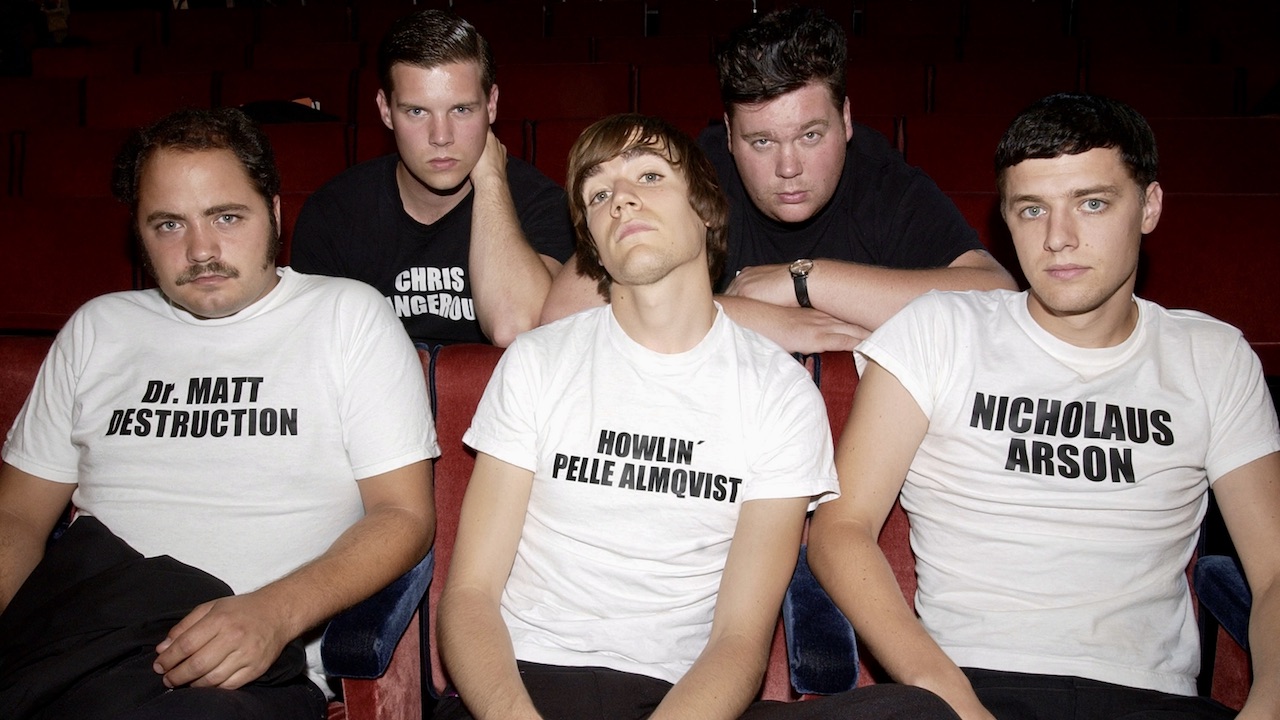When The Hives visited London in the winter of 2002, in support of the immodestly titled Your New Favourite Band, the beautiful people came out to play. As the band from Fagersta clattered their way through a headline set at the Astoria, among a capacity audience of 2000 people were such notables as Oasis’ Noel Gallagher, Primal Scream frontman Bobby Gillespie, and My Bloody Valentine leader Kevin Shields. Not that the Swedes were bothered about hobnobbing. In-between watching the evening’s support bands from the wings of the stage, singer ‘Howlin’ Pelle Almqvist seemed more concerned at the cost of entry to see his suddenly incandescently happening band.
“£12.50 to see us?” he said to music writer Ben Myers. “That’s way too much to pay. Even for genius.”
That customers were able to witness a concert by an international group for little more than a tenner at a venue that no longer exists is a gentle reminder that this happened rather a long time ago. Certainly, the media storm that descended on The Hives upon the release of Your New Favourite Band – which celebrates its 21st birthday on October 22 – today reads like ancient history. With column inches measured in yards, from broadsheet newspaper to rock weeklies, everyone was talking about them. As Caroline Sullivan from The Guardian noted when reviewing the group’s debut bow at the Astoria in December 2001, ‘With rock’s current flavour being the three-chord thrashing of the Strokes and White Stripes, the Hives couldn’t have picked a better moment to offer their Swedish-accented version’.
Your New Favourite Band was in fact a compilation. Comprising a dozen tracks culled from the quintet’s back catalogue – specifically, the albums Barely Legal (1997) and Veni Vedi Vicious (2000), as well as the A.K.A. I-D-I-O-T EP - its stated aim of raising the group’s profile in the UK (and beyond) was realised with a top 10 berth on the British chart following the decision by erstwhile Creation Records supremo Alan McGee to license the release for his Poptones imprint. (Across the world, the LP would be released on no fewer than five different labels.) Main Offender, a top 30 hit, provided the soundtrack to a high-profile commercial for Agent Provocateur starring Kylie Minogue. Lead-off single Hate To Say I Told You So also made the chart, peaking at number 23.
If one needs reminding that the industry in which The Hives operate is as much about marketing as music, it’s worth noting here that both singles were re-releases: when issued in 2000/2001 to promote Veni Vedi Vicious - when The Hives’ London engagement found them opening for the now long-forgotten Group Dogdrill and The Yo-Yo’s at the 600-capacity Garage in Highbury - neither song troubled the Official Chart Company compilers at all.
It’s a fickle business.
Despite the clamour, The Hives were less the best Scandinavian rock band of the time – that title goes to the feloniously under-considered Randy – and more the most on-brand. As with Meg and Jack White’s oft-repeated lie that the White Stripes were brother and sister, the Swedes led the press on their own merry dance with the claim that their material had been written by a reclusive Svengali by the name of Randy Fitzsimmons. As if to prove that journalists hunt in packs, everyone wanted to know whether or not this was in fact true - which it certainly wasn’t. Pressed on the matter in the Independent on Sunday, Almqvist claimed that he “was not allowed to say” what Fitzsimmons even looked like. By a distance of galaxies, this tiresome ruse was the least interesting aspect of the entire act.
Elsewhere, though, they talked a good game. Speaking to the now defunct Q magazine, Almqvist was far from shy in comparing The Hives to the best of the very best. The band were “like Muhammad Ali,” he said. “He was a pompous man, and a very funny man, but he was still the best fighter in the world. And we are the rock Muhammad Ali.”
They could be funny, too. Responding to Oasis frontman Liam Gallagher’s claim that their carefully curated image – at that time: shirts, shoes and sharp suits – put him in mind of The Monkees, the singer responded with the words, “Liam Gallagher looks more like a monkey than any of us.”
Looking back, one might be tempted to wonder quite what all the fuss was about. But the suggestion that The Hives were hyped and indulged beyond their station – which they most definitely were – risks overlooking admirable qualities that were, and which remain, on full display.
Twenty years after the release of Your New Favourite Band, the group appeared onstage at London's Wembley Arena in the middle of a three-act bill headlined by The Offspring. As the music-makers crashed into set opener Main Offender, the song’s evergreen vivacity filled the room with something close to timeless ease. The Hives may have at last found their level, but you can’t keep a good band down.
Because, really, as I learned first hand, it was never about being hip or happening. At the precise time that The Hives were being hyped by the kinds of newspapers and magazines that would come to drop them in an instant, on a cold day in the first week of April in 2002, I travelled to Fagersta to speak with the band.
Rather than encountering musicians who had developed a sense of entitlement that can often be the result of an avalanche of instant attention, I was instead received by a likeable gang of small-town Swedes who bore little relation to the misjudged fantasies projected upon them by the Fourth Estate.
In fact, after being picked up from the town’s only hotel by a van piloted by Pelle Almqvist and guitarist Nicholaus Arson (aka Niklas Almqvist, by two years the singer’s elder brother), the very notion of arch credibility was dispelled before the vehicle had been nudged out of first gear. A voice from the front seat called to me in the back. It told me to look in the carrier bag on the seat to my right.
“We bought you some chocolate,” a Swedish accent rang out. “Try some. It’s really very good.”
At their sharpest on Your New Favourite Band, so too were The Hives.
“We kind of knew we could make hits in the UK in a way by calling the album Your New Favourite Band,” Pelle Almqvist told music writer Luke Morton 15 years on. "It seemed like such a perfectly UK thing to do – and it worked! It was a clever bit of writing, and awesome rock ‘n’ roll, that made us popular.”

